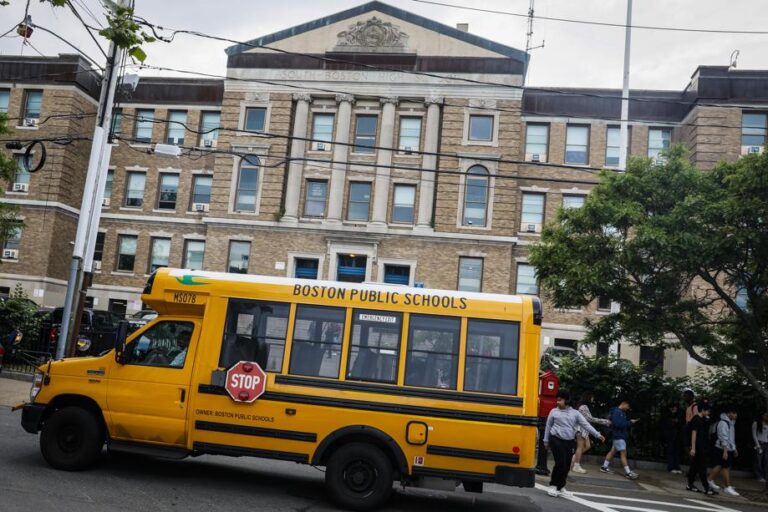Students with disabilities would be disproportionately affected by a new Boston Public Schools transportation policy that some advocates warned last week could strip hundreds of students of bus and van rides to school that are included under their legally binding special education plans.
The district’s new Ridership Procedure, unveiled last week, is meant to eliminate bus stops where students are no-shows for at least two weeks in a row. The system has been plagued by late buses for years, and a state-mandated improvement plan has forced the district to improve the on-time rate of its buses.
Critics such as Diana Santiago, legal director of Massachusetts Advocates for Children, said the plan would deprive parents of their rights under state and federal special education law.
School districts normally can’t make changes to students’ individual education plans — legal agreements spelling out the services they’ll receive in school, which can include transportation — without the permission of parents, according to Santiago.
Boston’s transportation plan would allow administrators to do exactly that, she said.
“I have serious concerns that this process is illegal as it’s written,’’ Santiago said. “The district is legally required to provide transportation where the student needs that because of their disability in order to benefit from special education.’’
Daniel Rosengard, the BPS executive director for transportation, said the new procedures focus solely on students who don’t take a district-provided bus or van to school, so resources can be directed at the students who do.
The district has determined that roughly 400 students with disabilities who have transportation included in their education plans are not using those services, according to Rosengard. Under the new procedures, which are expected to launch in May, Boston would be able to pause transportation for those special education students. He argued the district isn’t changing those students’ education plans, since transportation can be reinstated at any time.
“What this is is an operating procedure to make sure that we aren’t sending buses for students who don’t need and aren’t using the bus,’’ Rosengard said. “This is about pausing transportation for students who are not using the bus at all, and are not engaging with BPS transportation.’’
The district’s transportation plan makes use of data collected by a tracking app launched at the start of the academic year, which allows district officials to figure out which students are not taking the bus to school.
So far this year, the district has identified about 2,000 students who don’t use the bus, half of whom have opted out of the service after the district contacted those families, according to Rosengard. The district is still working with the remaining students, including about 400 students with disabilities who have transportation included in their education plans.
The district began outreach in October, calling and sending emails to families in their native languages. Ridership data is also shared with school building leaders so they can also have conversations about bus use with families, the district said.
The plan was developed by a Transportation Advisory Council that included students, families of students with disabilities, community partners, and BPS and non-BPS school administrators, according to the district.
So far, the district has shaved off about 400 bus stops from the 10,800 that were in place at the start of the school year, according to the district. Such changes have helped the district nearly hit its state-mandated on-time arrival rate of 95 percent.
It costs Boston about $180 million to transport more than 20,000 students, and those expenses are expected to rise about $8 million in fiscal 2026.
“The goal is about improving reliability and on-time performance for the students who use the bus and making sure that our resources are allocated equitably and efficiently,’’ Rosengard said.
That misses the point of offering transportation through students’ individual education plans, said Roxi Harvey, a former chair of the Boston Special Education Parent Advisory Council who is raising two teenagers with disabilities. Parents who secured transportation through their child’s individual education plan are entitled to those services, she said.
The district’s transportation plan puts cost-cutting ahead of children’s needs, she said, and erects a barrier between students and their education.
“The students that are the most vulnerable are being put in an even more precarious situation,’’ Harvey said.
Advocates like Santiago and Collins Fay-Martin argued if the district has data on which students with disabilities are not taking their transportation to school, administrators should try to understand why.
“If the students are not accessing transportation, BPS should be figuring out why and trying to resolve those issues, not take away their service,’’ Santiago said.
Advocates said there are numerous reasons why a student with disabilities isn’t taking their bus or van to school. They could be sick, or the student could have a safety concern on the vehicle, they said. The student may feel uncomfortable waiting for the transportation, and their parent is driving them to school instead. There could be language issues, or parents are unsure who to notify.
In some cases, a child who is behaviorally dysregulated just can’t get into the van or bus, and a parent may have to figure out another way to get the child to school.
A school district seeking to make a change to a student’s individual education plan would need to present those changes during a special education team meeting that includes the child’s parent, and then in writing to that child’s family. These meetings involve families and school district administrators and, at times, include attorneys representing each side. If the family doesn’t agree to the change, the district has the option of seeking a decision from the state’s Bureau of Special Education Appeals.
Families may be reluctant to pause special education transportation. Setting up those services for a student with disabilities can be a complicated, weeks-long process that can also involve coordinating adult monitors to ride along on the bus, Fay-Martin said.
“This is a very passive BPS policy that appears to suggest that no one at the school knows why the kid isn’t taking transportation,’’ she said.
Edith Bazile, a retired BPS educator and member of the Boston Special Education Advisory Council, said she’s worried parents will go along with Boston’s new procedures without understanding their rights under state and federal special education law.
If a student’s education plan says that child needs transportation to get to school, the district is required to provide it, Bazile said.
“The only way for that student to get to school is if the district provides transportation, so the district cannot create a policy that unilaterally removes that entitlement,’’ Bazile said. “We’re talking about a civil right.’’
John Hilliard can be reached at john.hilliard@globe.com.



